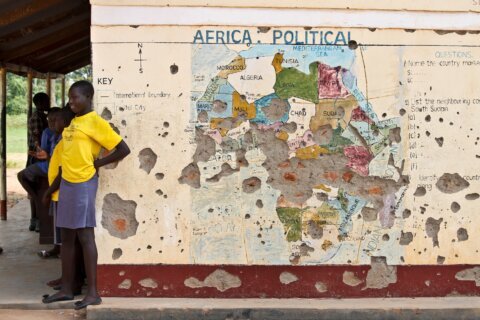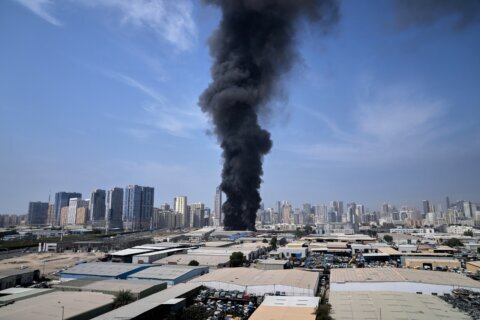It’s been a month of reflection for news icon Tom Brokaw, with the world marking anniversaries in two big stories that influenced his career: the 75th anniversary of D-Day and the 30th anniversary of the Tiananmen Square massacre.
And after covering the news for nearly 50 years, Brokaw is now drawing parallels between the presidencies of Donald Trump and Richard Nixon.
As Brokaw — a special correspondent for NBC News — finalizes a new project about his coverage of the Nixon years, he sat down with WTOP to reflect on his reporting and his extraordinary life.
His office inside New York’s Rockefeller Center feels a little like a history museum. The whole room hearkens back to his early days growing up in South Dakota.
Framed photographs of the legendary newsman with the Dalai Lama and Nancy Reagan sit on the ledge of a window that perfectly frames midtown Manhattan. Two decoy ducks sit atop southwestern-style rugs. Bronze busts of Churchill and Lincoln look on behind his massive oak desk. A set of antique U.S. Marine KA-BAR knives lie in a row near a framed photo of himself with a Special Forces commander he met in Afghanistan.
“I spent three days living on the base with him in the middle of nowhere. … They were out all night long shooting the bad guys and coming back to the base. And so I keep this around to remind me of what people … the sacrifices they are making,” he said, tapping the glass in the frame.
As you might expect, at 79, Brokaw has no shortage of memories from nearly a half-century of reporting from war zones, elections and uprisings. He recalls leaving China hours before the Tiananmen Square massacre began and rushing to catch one of the next flights back.
“The early protest in Tiananmen Square was a signal that there had been a profound change in that country. These very modern, young looking Chinese who were determined to have more of a say in the running of their country — they miscalculated. They thought those troops coming in their age would be sympathetic, but they were not.”
Many don’t know the story behind Brokaw’s dispatches from China just days after the government ordered the killing of young protesters. The massacre that claimed hundreds, if not thousands, of lives has been written out of Chinese history books.
“And we didn’t know whether we could get it on the air or not. We had to transmit out of our bureau there, but no one shut it down,” Brokaw recalled.
Then the anchor of “NBC Nightly News,” Brokaw and cameraman Tony Wasserman captured the first images of Beijing by hiding a camera under a box on the back of a bicycle. See video of Brokaw’s 1989 coverage in Tienanmen Square here. Brokaw explains his experience to WTOP in the video below:
“I don’t think I thought I was in personal grave danger. I did think I might get arrested,” Brokaw said of the risks he took in covering the days following the massacre.
It wasn’t the only risk he took in his career. When asked what assignment he found particularly challenging, Brokaw singled out the moment he had to ask a tough question of President Richard Nixon — one he knew deserved an answer. And he got pushback from White House press secretary Ron Ziegler.
“So I said, ‘Mr. President, aren’t you misleading the American public by saying executive privilege protects you even in impeachment?’ And the next morning Ron Ziegler gave me hell because he thought I was not appropriately courteous to the president. I’d known him a long time, and I said, ‘Ron, I’m here to ask questions, not to be courteous,’” Brokaw recalled.
In the fall, the author of the World War II history book “The Greatest Generation” will release a new work chronicling the final year of Nixon’s presidency. Brokaw has already drawn parallels between Presidents Nixon and Trump, but ongoing impeachment talk from congressional Democrats is not where he finds the similarities.
In an op-ed for the New York Times last March, Brokaw connected the administrations in how both presidents dealt with questions over their taxes, boasted friendships with celebrities and displayed what Brokaw characterizes as vindictive behavior toward former confidantes — first John Dean and, more recently, Michael Cohen.
“And like Mr. Trump,” Brokaw wrote in that Times op-ed, “Mr. Nixon hated the press.”
“On the other hand,” he told WTOP, “I think journalism on the other end of the spectrum has to be careful that it’s not just yelling ‘the sky is falling’ constantly, constantly, one cycle after another.
“I mean, ‘He’s a terrible president it’s not working’ — people sitting in suits in New York are saying that. People in the middle of America who are putting on their working clothes every day and have jobs now, they don’t see it that way,” Brokaw said.
From how it is covered to how it is published, the news has changed a lot since the 1970s. Even Brokaw reads the digital version of the newspaper, except for Sundays. He feels that the news industry is in transition and that anyone feels they can be a journalist. Specifically, he’s concerned with the amount of false information masquerading as fact. Brokaw shared what he advises friends to do when vetting a news source.
“Put as much effort into figuring out if your source of news is authentic as you would into buying a new toaster oven or a new television set. You know, make sure what you are getting on a day-to-day basis holds up. That it’s authentic. You can count on it. Don’t just take it and run with it. That’s a grave danger, and we haven’t worked out the formulation of that yet.”








